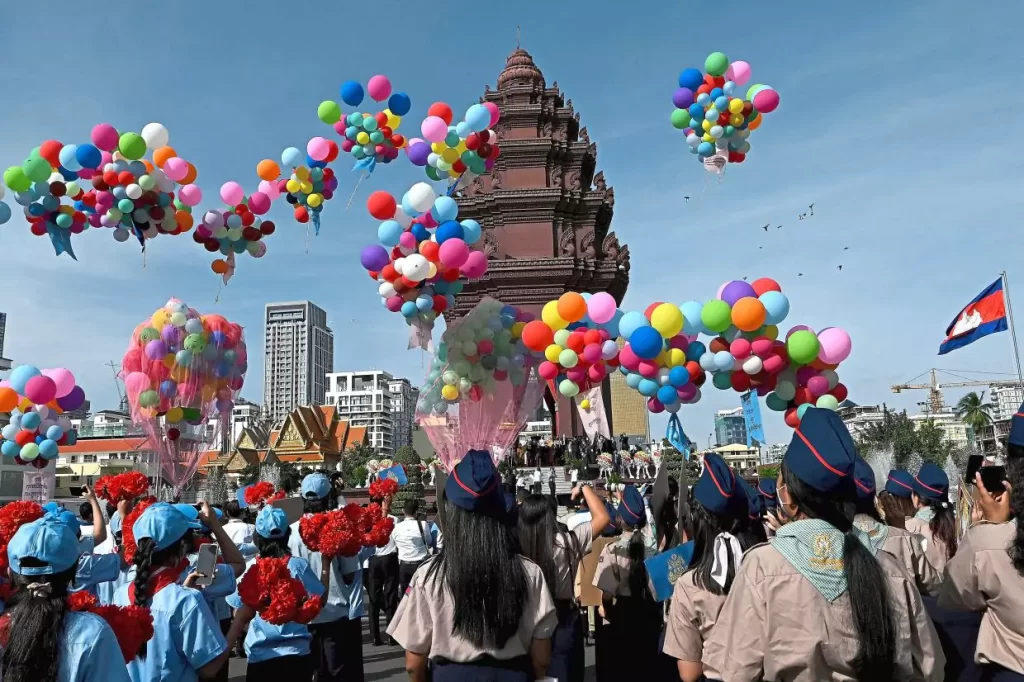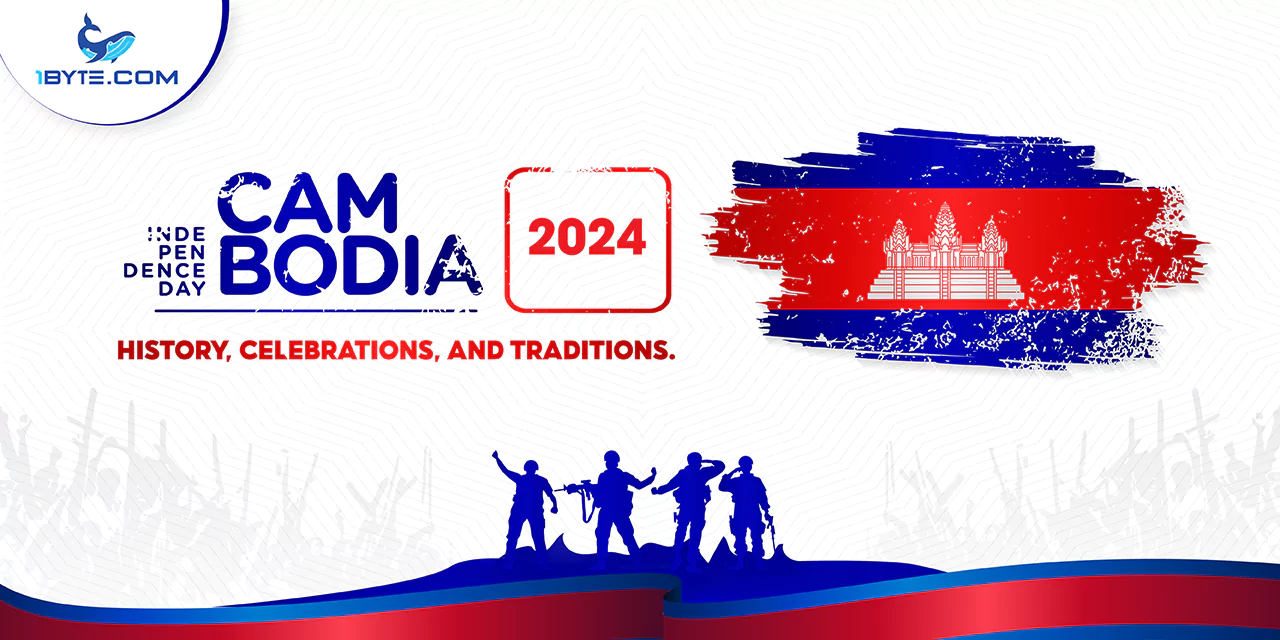Cambodia’s Independence Day 2024 is a momentous occasion that holds a special place in the hearts of Cambodians. This historic day marks their freedom and sovereignty. On this day, the entire nation comes together to celebrate with great enthusiasm and pride. The festivities are a vivid display of Cambodia’s rich culture and heritage. In this article, 1Byte will explore the significance of Cambodia’s Independence Day and the vibrant celebrations that accompany it. Join us as we delve into the history and traditions of this remarkable day.
Historical Background
In the 19th century, Cambodia found itself under the rule of the kingdom of Siam, becoming a vassal state. To break free from this dominance, King Norodom took a crucial step. On August 11, 1863, he signed a treaty with France, declaring Cambodia’s status as a protectorate under French rule, effectively ending Siam’s control.
This pact, while liberating Cambodia from Siamese influence, led to a period of French occupation. During World War II, the Japanese seized control of Cambodia, occupying the country. On March 9, 1945, at the request of Japanese forces, Cambodian King Norodom Sihanouk declared Cambodia an independent Kingdom, supported by the Japanese government. However, full independence from the French was still elusive.
In 1946, Cambodia gained self-rule within the French Union, marking a significant shift. But in 1949, the protectorate status established by the earlier treaty was revoked by the French. By June 1952, King Sihanouk had decided to actively pursue Cambodia’s complete independence. He dismissed his cabinet, suspended the constitution, and assumed the role of prime minister.
In March 1953, King Sihanouk journeyed to France to persuade the French government to grant Cambodia full independence. His campaign proved successful, leading to an announcement on July 3, 1953, when the French government expressed its readiness to confer complete independence upon Cambodia, Vietnam, and Laos. King Sihanouk regained control of crucial aspects of Cambodia’s governance, including the military, police, foreign relations, trade, the judicial system, and the country’s finances. This marked a pivotal moment in Cambodia’s journey to independence, which culminated into Cambodia’s Declaration of Independence from France on 9 November 1953.
Celebrations

The people of Cambodia come together in different parts of the country to celebrate Cambodia’s Independence Day. The main venue for the official celebrations is the Independence Monument, located in the capital, Phnom Penh. Here, every year, a high-ranking official lights a ceremonial flame within the monument, and the monument’s stairs are adorned with flower tributes.
This celebration is more than just an event; it’s a symbol of King Sihanouk’s heroism and the nation’s struggle for freedom. He is affectionately known as “the Father of Independence” for his pivotal role in securing Cambodia’s autonomy.
In 2024, Cambodia’s Independence Day falls on Saturday, November 9. For all Cambodians, this day is a source of joy and pride as they commemorate their remarkable journey to independence and pay tribute to the individuals who made it all possible. It’s a day of reflection, celebration, and national unity.
Events for Cambodia’s Independence Day 2024
Cambodia’s Independence Day, celebrated on November 9, 2024, marks 71 years of freedom from French colonial rule. The day is filled with vibrant events and activities across the country, with the main celebrations taking place at the Independence Monument in Phnom Penh.
Parades and Festivities: The day kicks off with colorful parades featuring traditional Khmer music and dance performances. These parades showcase Cambodia’s rich cultural heritage and bring communities together in celebration.
Fireworks Display: As the sun sets, a spectacular fireworks display lights up the sky over Phnom Penh. This grand finale is a highlight of the day, drawing thousands of spectators.
Cultural Performances: Various cultural performances, including traditional songs, dances, and folk games, are held throughout the day. These performances highlight the resilience and strength of Cambodian culture.
Street Food and Fairs: The streets come alive with food stalls offering delicious Cambodian delicacies like Samlor Korkor, Bai Sach Chrouk, and Kha Sach Ko. People from all walks of life gather to enjoy the festive atmosphere and savor the local cuisine.
Leverage 1Byte’s strong cloud computing expertise to boost your business in a big way
1Byte provides complete domain registration services that include dedicated support staff, educated customer care, reasonable costs, as well as a domain price search tool.
Elevate your online security with 1Byte's SSL Service. Unparalleled protection, seamless integration, and peace of mind for your digital journey.
No matter the cloud server package you pick, you can rely on 1Byte for dependability, privacy, security, and a stress-free experience that is essential for successful businesses.
Choosing us as your shared hosting provider allows you to get excellent value for your money while enjoying the same level of quality and functionality as more expensive options.
Through highly flexible programs, 1Byte's cutting-edge cloud hosting gives great solutions to small and medium-sized businesses faster, more securely, and at reduced costs.
Stay ahead of the competition with 1Byte's innovative WordPress hosting services. Our feature-rich plans and unmatched reliability ensure your website stands out and delivers an unforgettable user experience.
As an official AWS Partner, one of our primary responsibilities is to assist businesses in modernizing their operations and make the most of their journeys to the cloud with AWS.
The Impact of the Independence Day
Cambodia’s independence had a profound impact on the nation’s future. With autonomy came a new era of possibilities and challenges. The legacy of independence still shapes Cambodia today.
One significant impact was the restoration of national pride and identity. For the first time in decades, Cambodians could take charge of their destiny. The newfound freedom allowed them to rebuild and redefine their country.
Independence also paved the way for economic growth and development. Cambodia could now chart its economic course and engage in international trade. This, in turn, led to progress and opportunities for its people.
Moreover, independence played a vital role in fostering a sense of unity and self-determination. Cambodians came together, inspired by the struggles of the past, to create a brighter future. The spirit of resilience and independence continues to be a driving force in the nation.

